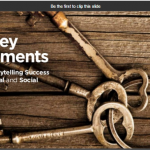The world of marketing and business is changing so fast, chances are you feel like you're falling hopelessly behind in some aspect of it. Everyone is sorting through all the digital and social marketing tools and trends that seem to pop up like weeds overnight. And as soon as you learn one thing, something new comes along that you have to learn. You finally jump on the foursquare bandwagon and suddenly Facebook announces it's new geolocation service that just might make foursquare obsolete. Or will it? Nobody knows for sure. It's both an exciting and frustrating time for businesses and marketers alike.
The real problem isn't that you can't keep up. It's that you're so busy trying to keep up that you don't see where we're really going. And you probably won't be ready for it when it gets here. Just where are we going? Is there a post digital world coming that we can't see through all the apps popping up in our vision today?
Shiv Singh of Razorfish talked about this very subject at the Future Midwest conference last month. He said we're beginning to go through a Digital Renaissance. He likened this to the Renaissance period in history. Where the Renaissance was a bridge between the middle ages and modern era, the Digital Renaissance is a bridge between the Digital Age and the Post Digital Era. And now is the time to start thinking beyond the digital age we're in. Singh talked about how things are changing. Consumers don't align with brands the way they used to, they instead are starting to align with each other. Hotels are starting to worry way more about their online trip adviser ratings than advertising, because that's the biggest influencer of travelers. Ad dollars are moving to digital. Digital is beginning to become an awareness driver equal to TV; it doesn't have the reach TV has but it's getting there.
Singh describes the post digital era as one where we don't think about or talk about digital, it's just an ambient part of our life. Our living rooms will have more computing power than the combined might of the entire Royal Oak Music Theater full of geeks' laptops and cell phones. But it won't be visible, it'll just be wired into the room. Augmented realities will become our reality, with all kinds of facts, figures and info always available to us. Everything will be mobile. Location aware living will be assumed. For instance, just walking into a hotel with your device on you will check you in, without ever having to see anyone. There will only be one social network – yours. They morph into one portable social graph that you have control over and is not owned by anyone. Communities will get real again, instead of virtual. Time spent online will begin to plateau.
It's an interesting view of where we're headed. But what does it mean to us as marketers or business owners and managers? It means the brand advocates of today will be the participants of tomorrow. Singh threw up Pepsi as an example of how some brands are working towards that kind of marketing now. Instead of spending millions on Super Bowl ads, Pepsi spent that money on their Refresh project, helping advocates move the ideas that they're passionate about forward. To thrive in this Post Digital Era, brands will need to build deep social experiences. Storytelling by social influencers will start to replace advertising. Brands will start spending money on helping people tell stories instead of online advertising.
So, what can you do now to prepare for this future? Where does storytelling fit into your marketing plan? Who are the storytellers who can become your brand's advocates? We need to take some time away from learning the latest and greatest tools and start to put together strategies on where we need to be heading, not just to survive, but to thrive in the future. It's a good lesson for all of us. Thank you, Shiv Singh for giving us a pause for the cause, as it were.
Mike McClure, Yaffe Exec Creative Director & Chief Storyteller







Mike-
Shiv was one of my favorite interviews from Future Midwest. We could have talked for hours about this subject because he sees it so clearly. It will be interesting to see how we all adapt to the coming post-digital world.
Dave:
He was one of my favorite presentors as well. I think it was his clear vision and his ability to make us see it the way he does that made it so powerful. It is hard to adapt to the coming world when you’re scrabbling to keep up with the current one, though. Those who can, will be ahead of the rest